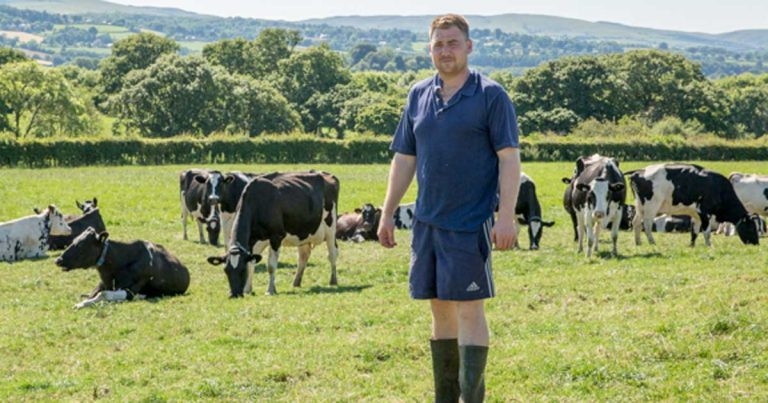30 Aug 2022
Twelve farms are taking part in the latest phase of the Arwain DGC project, which aims to highlight ways of preventing antimicrobial resistance.

Tom Bletcher has boosted the dairy herd at his farm near Mold with the installation of an automated footbath.
Embracing technology is critical to cutting the use of antibiotics in farming and potentially raising the industry’s productivity, a group of vets and producers has said.
Twelve farms across Wales are taking part in the latest phase of the Arwain DGC project, which aims to highlight ways of preventing antimicrobial resistance (AMR) as “proof of concept sites [PoC]”.
Project leaders hope to show off the innovations being deployed at the sites during a series of open days in the coming months, although no firm dates have yet been announced.
But Stefan Totir, a veterinary prescribing champion and a member of the project’s clinical guidelines working group, said the issue must be addressed now before it’s too late.
He said: “It is simple – these are the only antibiotics we have.
“The more we use them and, more importantly, use them in a wrong way (low/high dose, viral infections, longer/shorter administration period), the sooner we will have resistance from a variety of pathological agents.”
The participating farms are split equally among beef, dairy and sheep operations, although officials hope the project will ultimately support equine keepers and vets, as well as farmers.
Vet Rees Matthews, who works with one of the participating farms in Carmarthenshire, said the experiences of some sites demonstrated the importance of the project.
He said: “With increasing cases of treatment failure on similar farms due to resistance to, in some instances, multiple commonly used antibiotics, the results from projects like this will hopefully be useful to encourage other farmers to be more confident in cutting down on antibiotics.”
Beef producer Iwan Davies, who farms in Conwy, is trialling bolus technology that is intended to act as an early warning system for potential infections or other health issues, such as mastitis and lameness.
The system also allowed him to give cows one long-acting antibiotic post-calving, rather than repeated doses over five to seven days.
Mr Davies, who also runs a mobile catering business serving the farm’s Luing beef at events, said the technology benefits both operations, but doesn’t undermine the farmer’s role.
He said: “The system does not take the place of good husbandry or management – we’ve still got our eye on everything – but anything that can further help us, and help reduce the need for antibiotics, is a plus.
“We’re in direct contact with consumers, who give us feedback. We go from field to fork and knowing how everything is reared is becoming more of a priority for people.”
Information from the system can also be shared with farm vet Joe Angell, who said it’s an “exciting” development.
He said: “We hope it will enable more rapid detection of those cattle that need attention, either because they are calving, bulling or failing to show any heat activity, or because they are ill.”
Elsewhere, the installation of an automated footbath has boosted the dairy herd of Tom Bletcher at his farm near Mold.
Instead of a regular disinfectant-based bath, Mr Bletcher’s herd is now walked through an automated bath in his milking parlour twice a day and a veterinary check found the level of M2 active digital dermatitis lesions in the herd had fallen from 7% in February to only 2% in June.
He said milk processors are increasingly requiring reductions in antibiotic usage and the new approach meant they were also able to reduce the concentration of the chemicals used.
Mr Bletcher added: “I think the automatic footbath was money well spent as the herd health has improved and the need to use antibiotics has reduced.”
Arwain DGC project manager Dewi Hughes said: “We will be hosting open days on these farms from the autumn onwards.
“We look forward to showing first-hand how the techniques and technology has worked to reduce the need to use antibiotics and improve productivity.”
Eiry Williams, North Wales project officer, added: “Reducing and using antimicrobials responsibly is vitally important for human and livestock health.
“I am looking forward to working with the PoC farms in trying to achieve this, while maintaining and possibly increasing productivity.”
The new programme follows the launch of a 12-month study by academics from the University of Bristol in the spring, which will collect samples from 40 farms to investigate the extent of AMR in the beef, dairy and sheep sectors.
The researchers hope that work will provide more detail about the potential sources of AMR and inform the development of potential surveillance apparatus.
For more information on the project, visit www.arwaindgc.wales